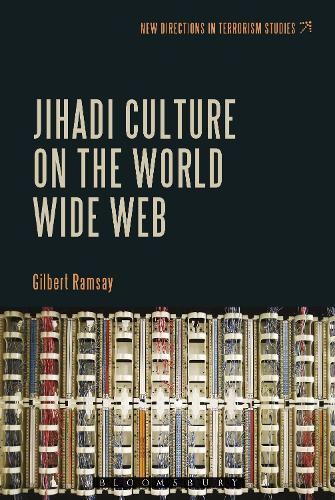
Jihadi Culture on the World Wide Web
(Hardback)
Available Formats
Publishing Details
Jihadi Culture on the World Wide Web
By (Author) Dr. Gilbert Ramsay
Bloomsbury Publishing PLC
Bloomsbury Academic USA
5th December 2013
United States
Classifications
Tertiary Education
Non Fiction
Social groups: religious groups and communities
Internet: general works
363.32502854678
Winner of Choice Outstanding Academic Title 2015 (United States)
Physical Properties
Hardback
272
Width 152mm, Height 229mm
558g
Description
Choice Outstanding Academic Title 2014 This volume examines "jihadi" content on the Internet by drawing on both Arabic and English primary source materials. After examining this content as digital media, the work looks at how it is productively consumed by online communities, including how "jihadi" individuals construct themselves online and how jihadism is practiced and represented as an online activity. The work also discusses the consumption of such jihadi media by those who are hostile to radical Islam and the relation between fantasy, pleasure, ideology, and ordinary life. This unique survey features case studies, such as the cyberjihadi "Irhabi 007," pro-US and Israeli "patriots" who are often openly Islamophobic, and "Infovlad" --a forum that became the meeting place for radical Islamists and radical freelance "counter terrorists." This innovative approach to studying violent content on the Internet is a significant contribution to the literature that will appeal to anyone interested in political violence, terrorism, and political communication.
Reviews
This comprehensive, forensic analysis of 'Jihadi' content on the Internet is of great help in understanding and assessing the related security threat. Gilbert Ramsay makes a compelling case for drawing a clear distinction between on-line and off-line activity. He looks deeply into the nature of 'salafi-jihadist' material on the web, and offers an interesting and novel take on the possible drivers behind its production and consumption. * Richard Barrett, former head of the United Nations Working Group on The Use of the Internet for Terrorist Purposes *
This is a refreshing, distinctive and fascinating book. Gilbert Ramsay takes us a major step forward in terms of how we can and should think about the role the internet plays in modern terrorism. * Andrew Silke, Director of Terrorism Studies, University of East London School of Law and Social Sciences, UK *
In view of the recent Boston marathon bombings in the US and public murder of a serving British soldier in Woolwich UK, this book is a timely reminder of the necessity to further examine and narrow the debate regarding the potentially devastating effects of online violent radicalization. This authoritative research and analysis is important for policy makers and practitioners alike, particularly in view of their tendency to introduce potential knee-jerk legislation that risks infringing upon individual laws that extend to private access and use of the Internet. This book provides a nuanced perspective of the issues related to online radicalization, addressing the over emphasis and inconsistencies that have unfortunately plagued this particular field of study. * Dr. Abdul Haqq Baker, former chairman of Brixton Mosque, UK, founder and director of STREET UK and author of Extremists in Our Midst: Confronting Terror (2011) *
Theoretically sophisticated and empirically rich, Ramsays text is a fresh and distinctive contribution to debates on the intersections of terrorism and the Internet and is thus recommended. Acting as an antidote to media and policymakers assumptions that the Internet is responsible for much contemporary terrorism, his analysis is critical in the best sense: thoughtfully critiquing the literature produced in this area to-date and grappling with its inconsistencies. The embedding of online jihadism as a particular (sub-)cultural practice consistent with contemporary cultural and new media theory, is an additional noteworthy aspect of the analysis. * Maura Conway, Dublin City University, Ireland *
Drawing from a wealth of original Arabic-language primary sources, [Gilbert Ramsay's] book makes a novel and highly valuable contribution to the debates surrounding violent radicalization online. -- Anne Stenersen * E-International Relations *
Ramsay (Centre for Terrorism and Political Violence, St. Andrews, UK) makes a significant contribution to the understand of terrorism on the web. Utilizing a critical perspective, Ramsay considers what it means to read and participate online and, in doing so, calls into question much of the conventional wisdom about how individuals are radicalized in cyberspace. Here he suggests that Jihadi readers might try out and develop ideas in cyberspace and thus he cautions against taking everything found in such fora at face value. He also shows that many of the most radical sites have very small audiences. This work, based on his doctoral dissertation, presents extensive empirical data on the size of Jihadi audiences in different fora, participation rates, and modes of discourse. The work contains original translations and excerpts from existing online fora, along with the author's interpretation and commentary. This work deserves to be widely read and serves as the seminal book for understanding the phenomenon of Jihadi's in the virtual world. This work could very well impact the development of current counter-terrorism policies in cyberspace by the US and its allies. Summing Up: Highly recommended. All readership levels.-- -- M.B. Manjikian * CHOICE *
Author Bio
Gilbert Ramsay works at the Centre for the Study of Terrorism and Political Violence at the University of St. Andrews, UK. An Arabic speaker, he has previously written reports on terrorism and the Internet for the United Nations and the European Union.
